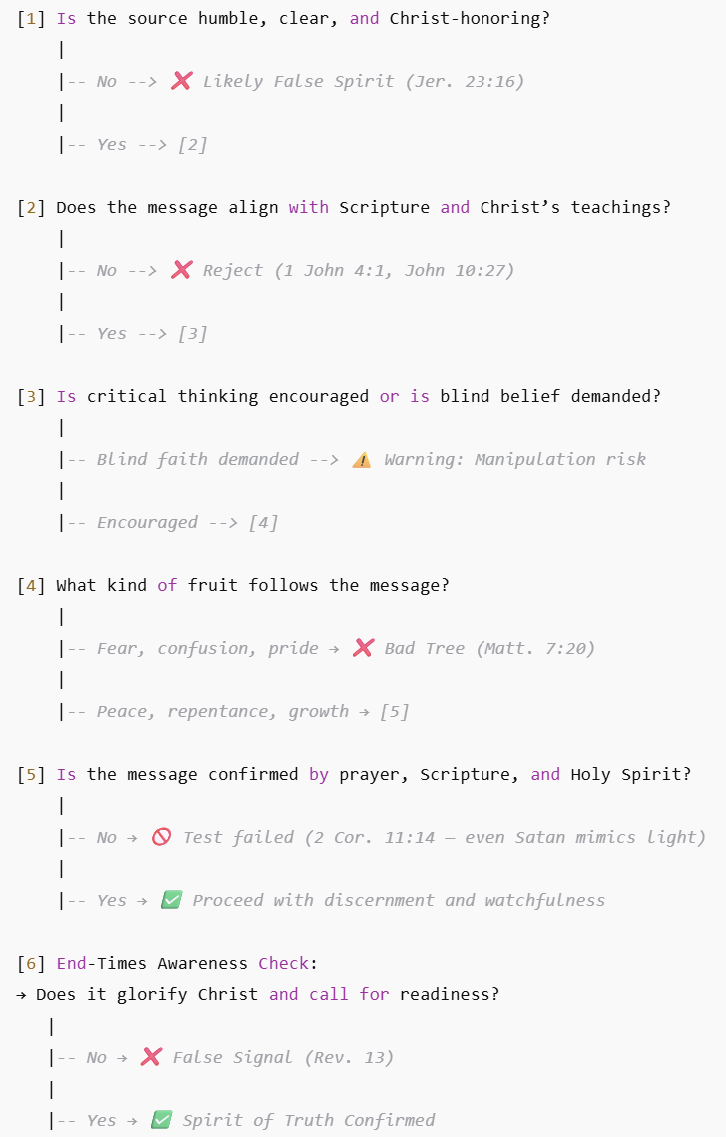How can I discern a false prophet or a fake believer, especially when they speak in God’s name or seem spiritually gifted?
Not everyone who claims to speak for God truly does — and not everyone who appears “spiritual” walks in His truth. Scripture gives us loving but serious warnings to be vigilant, discerning, and rooted in Christ.
"You will recognize them by their fruits."
— Matthew 7:16 (ESV)
Here’s a video that shares insight into how a false prophet led many into a season of confusion, doubt, and spiritual darkness.
It’s a sobering reminder of why discernment matters — and how even sincere seekers can be misled when truth is replaced with charisma or control.



Holy Spirit–Led Discernment Flowchart
Test the spirits with truth, wisdom, and peace (1 John 4:1)
✅ Answer: How Do I Discern a False Prophet or Spiritual Deceiver?
In every area of life — whether in politics, science, business, or personal relationships — we instinctively ask a fundamental question:
“Is this person who they claim to be?”
The same principle applies to spiritual voices. Across history, many have claimed divine insight, supernatural authority, or spiritual gifting — yet not all were authentic. Some misled others knowingly, seeking control, admiration, or profit.
Even if you're not religious, the question still holds weight:
How can I tell the difference between truth and deception in the spiritual world?
Here are five core principles rooted in reason, ancient Scripture, and human experience — offered not to force belief, but to guide honest seeking.
🔍 1. True Authority Produces Real Fruit
We don’t trust a tree by its label — we examine its fruit. Jesus taught this plainly:
“You will recognize them by their fruits.”
— Matthew 7:16 (ESV)
Charisma, eloquence, or mystical language may impress — but the deeper test is this:
Do their teachings bring about freedom, healing, growth, and love?
Or do they produce fear, dependency, division, or pride?
Even Scripture warns against spiritual leaders inflated by personal visions or emotional display:
“Let no one disqualify you… going on in detail about visions, puffed up without reason by his sensuous mind.”
— Colossians 2:18 (ESV)
The point is universal: Beware of ego dressed in spiritual language.
🔍 2. Beware of Words That Comfort, but Never Correct
In every generation, there are voices that speak only what people want to hear.
“This is what the Lord Almighty says:
Do not listen to what the prophets are prophesying to you;
they fill you with false hopes.
They speak visions from their own minds, not from the mouth of the Lord.”
— Jeremiah 23:16 (NIV)
A message that only reassures, entertains, or flatters — without ever calling for self-examination, repentance, or moral clarity — should raise concern.
Real truth often discomforts before it heals.
🔍 3. Observe Their Reaction to Being Questioned
False prophets may tolerate praise — but often resent questions.
In Jeremiah 21, leaders sought divine answers only when convenient — after ignoring every earlier warning.
Similarly, manipulative voices today may avoid accountability, silence dissent, or frame honest questions as betrayal.
But the Bible’s instruction is timeless:
“Test everything; hold fast what is good.”
— 1 Thessalonians 5:21 (ESV)
Genuine truth never fears examination.
Healthy faith welcomes doubt, invites inquiry, and grows stronger through testing.
🔍 4. Real Guides Point You to God — Not to Themselves
A true spiritual teacher leads you away from dependence on them and closer to the source of truth.
“My sheep hear my voice, and I know them, and they follow me.”
— John 10:27 (KJV)
False prophets often center the message on themselves, their power, or their exclusive access to truth.
But authentic voices inspire personal relationship with God, not loyalty to a personality.
Ask:
Do they clarify your spiritual journey — or complicate it by placing themselves at the center?
🔍 5. Look Beyond Image — Seek Integrity
Not all who seem “good” are truly good. But over time, truth reveals itself through consistency, humility, and character.
Watch what they do when:
No one is watching
They're criticized
They have power or influence
Are they servants? Are they willing to learn, admit wrongs, and walk in love?
True light doesn’t need to shout. It shines.
✔ Quick Discernment Checklist
Ask yourself:
Do they invite honest questions — or shame you for doubting?
Do they promote obedience, healing, and truth — or secrets, visions, and control?
Do they point to Scripture and sound reasoning — or to themselves as the only way?
Do their actions match their words, even in private?
Do they speak with humility and love, or with spiritual superiority and showmanship?
Even Prophecy Warned Us About This Time
What we're witnessing today — spiritual confusion, deception in leadership, and the rise of manipulative voices — is not a random cultural moment. It was foretold long ago in Scripture, and it aligns with the deeper shifts many feel internally but struggle to articulate.
"Then I saw another beast rising out of the earth. It had two horns like a lamb and it spoke like a dragon."
— Revelation 13:11 (ESV)
This figure looked harmless — even Christ-like — but spoke with a voice of distortion. It’s a portrait of false spiritual authority that mimics the appearance of good while spreading confusion and control.
Discernment Isn’t Optional — It’s a Logical and Spiritual Imperative
In a world saturated with information, ideas, and ideologies, discernment is not only a spiritual command — it’s a logical necessity. Even those outside the Christian faith recognize the psychological dangers of manipulation, groupthink, and ideological echo chambers.
"Beloved, do not believe every spirit, but test the spirits to see whether they are from God, for many false prophets have gone out into the world."
— 1 John 4:1 (ESV)
This verse doesn’t call for blind belief — it calls for thoughtful engagement, critical thinking, and spiritual awareness. It is a framework for investigation, not indoctrination.
The Scientific and Rational Basis for Believing in Christ as the Rhema (Living Word)
Many assume that science and faith are in conflict — but this is a misunderstanding. In reality, modern discoveries in quantum physics, neurology, and cosmology suggest that reality is far more complex, interconnected, and intelligent than once believed.
Quantum theory, for example, shows that conscious observation affects the state of matter — a phenomenon that parallels the biblical concept of Rhema: the spoken, living Word that brings invisible potential into manifested form.
"In the beginning was the Word, and the Word was with God, and the Word was God."
— John 1:1 (ESV)
The “Word” here — Logos — refers to the divine reason, but Jesus also functions as Rhema: the personal, spoken Word of God that actively transforms the human soul.
Science confirms that words have neurological effects. Neuroplasticity demonstrates that the brain physically restructures itself in response to spoken truth or trauma. Words shape belief. Belief shapes perception. Perception defines behavior. This is not wishful mysticism — this is observable, measurable human transformation.
Christ as Rhema is not an abstract concept; He is the active force of truth that resonates with those willing to listen, intellectually and spiritually.
Historically Verified: Jesus Was Not Invented by Religion
Contrary to some modern skepticism, Jesus of Nazareth is one of the most historically verified individuals in ancient history. Historians such as Josephus (Jewish) and Tacitus (Roman), who were not Christians, acknowledged His life and the early Christian movement.
Even the most critical secular scholars agree that:
Jesus existed
He was crucified
His followers believed He rose from the dead
The movement He sparked transformed civilizations
Faith in Christ is not a rejection of reason — it is a reasonable invitation to trust what has been both documented and personally confirmed by millions across time.
A Battle for the Mind and Soul
The Book of Revelation unveils that the final conflict is not merely physical — it is ideological and spiritual. Truth will not be defeated by force, but by deception. That’s why spiritual charlatans will appear persuasive, charismatic, and even loving — yet their fruit will be fear, control, and division.
"...they are demonic spirits performing signs, who go out to the kings of the whole world..."
— Revelation 16:14 (NIV)
Deception is powerful because it feels good before it’s exposed. And the most dangerous lies are the ones that sound closest to truth.
Even Jesus warned:
"Watch out that no one deceives you. For many will come in my name, claiming, 'I am the Messiah,' and will deceive many."
— Matthew 24:4–5 (NIV)
You’re Invited — Not to Religion, But to Truth
If you’re skeptical of religion — you’re in good company. Even Jesus challenged the religious elite who used spiritual systems to control people.
He invites you not into blind allegiance, but into a relationship with truth itself — truth that can be tested, verified, and trusted.
"I stand at the door and knock. If anyone hears my voice and opens the door, I will come in..."
— Revelation 3:20 (ESV)
As the Rhema, Christ still speaks — not through control or fear, but with love, clarity, and reason.
You don’t have to abandon logic to embrace faith. In fact, real faith demands more logic, more courage, and more honesty than any ideology ever could.
"If I find in myself a desire which no experience in this world can satisfy, the most probable explanation is that I was made for another world."
— C.S. Lewis
Ask. Test. Think. Seek.
You were designed to discern. You were created to think, feel, reflect, and perceive.
And Jesus — as the Living Word — welcomes that. You don’t need to perform. You don’t need to pretend. You just need to respond.
Consider These Questions:
What voices are shaping your truth — and do they lead to clarity or confusion?
When you strip away religion and culture, what remains that feels undeniably real?
If truth is a Person, what would it mean to meet Him?
Truth doesn’t need coercion. It invites courage. And Jesus — the Rhema Word — is still speaking to those who are listening.


A Closing Word for the Skeptical and the Seeking
We’re living in a time where both truth and deception are louder than ever. But noise isn't clarity.
Here’s a deeper truth: Not every spiritual experience is real — but not every doubt is wrong.
Jesus Christ remains a singular figure in all of history — not as a religious mascot, but as the convergence of wisdom, power, and love. His life and words offer a timeless model for discernment, freedom, and healing.
If you’re seeking truth, you’re already on the right path.
Let faith and reason walk beside you.
You are invited to test — and to find.
“You will seek me and find me, when you seek me with all your heart.”
— Jeremiah 29:13 (ESV)
So question boldly. Seek slowly. Discern wisely.
Because whether or not you believe in God yet — you were made for truth.
We are in a time where both truth and deception increase in visibility.
Jesus Christ remains the only center where wisdom, power, and love converge in perfect balance.
If you’re seeking truth — you’re already on the right path.
Not everything labeled “spiritual” is good. But not every question is doubt.
Keep seeking with an open heart and a discerning mind.
Let faith and reason walk beside you.
You are invited to test — and to find.
